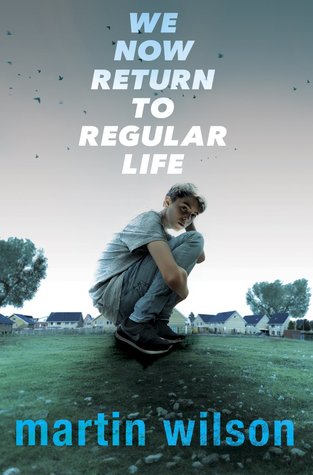- Visionary Violence: Return to the Dark Valley by Santiago Gamboa

- Pageslayers lays down literary roots in the Opa-Locka community
We Now Return to Regular Life by Martin Wilson
Pablo Cartaya

Contemporary young adult literature is at its best when the author isn’t afraid to put their teen characters in difficult situations. Think about Laurie Halse Anderson’s novels, or the work of A.S. King, Adam Silvera, and Ellen Hopkins. All of these novels talk about teens coping with abuse, their own sexuality, and the navigation through the difficulties of life as a teenager in today’s world. Martin Wilson’s newest young adult novel, We Now Return to Regular Life is another brave and important addition to the canon. The novel asks the question, what happens to siblings and close friends when an abducted child returns home?
Beth Walsh’s brother Sam has been missing for three years. She thought he was dead. His childhood friend Josh was the last one to see him alive. In the opening pages of the novel we learn that Sam has miraculously returned, setting off a maelstrom in the community that uproots the lives of everyone in Sam’s life, especially Beth and Josh. Told in alternating points of view, Josh and Beth recount how they cope with Sam’s re-entry into their lives just as they were beginning to move on from the tragedy. Josh says to Sam, “‘You can tell me stuff,’ I say. And I mean it. But I also hope he doesn’t want to tell me anything else.”
Like Wilson’s previous award-winning novel, What They Always Tell Us (Delacorte, 2008), We Now Return to Regular Life is set in Alabama and explores teens coping with acceptance and their own sexuality. As with What They Always Tell Us, it’s the quiet moments in this novel that pack the biggest emotional punch. Josh doesn’t know how to deal with the feelings he’s having for Sam. “I could slide my hand over and touch his, and comfort him, but I don’t. Boys don’t do that. I don’t do that.” Teens will appreciate the internal complexities of facing one’s own sexuality in an ever judgmental and dangerous world.
Beth’s storyline provides insight into a sibling feeling marginalized by her family and the extra attention of being the sister of an abducted child who has miraculously returned home. A senior in high school, she is trying to move on with her life, but Sam’s return throws everything into a tailspin. “Don’t expect me to jump up and down and act all happy that you’ve actually acknowledged me. You’re all here because of Sam.” She is soon not only alienating her family but her friends at school as well. “I just wanted you guys to be normal,” she tells her friend Chita. “So that I could be normal. I don’t—I didn’t want you all to pity me.”
Wilson’s characters grapple with their identities and their place in each other’s lives until everything comes crashing together in dramatic fashion. Wilson forces his protagonists to confront the pain and confusion of the past and defy truths that are too dangerous to ignore. Despite the heavy subject matter, Wilson provides some levity in the dark circumstances facing the central plot. “It’s not pity dumbass,” says Beth’s friend, Chita. “It’s like love, I guess.”
At its heart are three compelling teens who want stability, friendship, love, and normalcy in their lives. This is something we can all relate to. Sam’s reentry into Beth and Josh’s world provides the foundation for healing and ultimately a way forward. Wilson’s portrayal of families and friends broken by the abduction of a child is a compelling and worthwhile read.
Pablo Cartaya is the author of the acclaimed middle grade novel, The Epic Fail of Arturo Zamora and the forthcoming Marcus Vega Doesn’t Speak Spanish.









